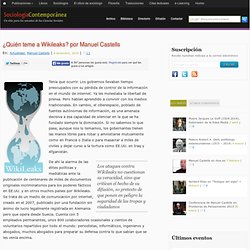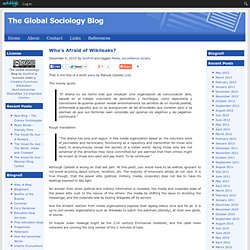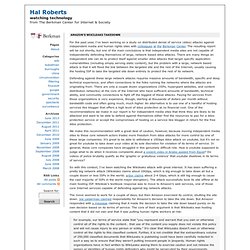

Sociología Contemporánea - Actualidad, libros, humor y Ciencias Sociales. Tenía que ocurrir.

Los gobiernos llevaban tiempo preocupados con su pérdida de control de la información en el mundo de internet. Ya les molestaba la libertad de prensa. Pero habían aprendido a convivir con los medios tradicionales. En cambio, el ciberespacio, poblado de fuentes autónomas de información, es una amenaza decisiva a esa capacidad de silenciar en la que se ha fundado siempre la dominación. Si no sabemos lo que pasa, aunque nos lo temamos, los gobernantes tienen las manos libres para robar y amnistiarse mutuamente como en Francia o Italia o para masacrar a miles de civiles y dejar curso a la tortura como EE.UU. en Iraq y Afganistán.
Su presupuesto anual es de unos 300 millones de euros, producto de donaciones, cada vez más confidenciales, aunque algunas son de fuentes como Associated Press. Han recibido numerosos premios internacionales de reconocimiento a su labor, incluyendo los de The Economist y Amnistía Internacional. El drama no ha hecho más que empezar. The Global Sociology Blog. Who’s Afraid of Wikileaks?

December 4, 2010 by SocProf and tagged Media, surveillance society That is the title of a short piece by Manuel Castells (via) The money quote: “El drama no ha hecho más que empezar. Una organización de comunicación libre, basada en el trabajo voluntario de periodistas y tecnólogos, como depositaria y transmisora de quienes quieren revelar anónimamente los secretos de un mundo podrido, enfrentada a aquellos que no se avergüenzan de las atrocidades que cometen pero sí se alarman de que sus fechorías sean conocidas por quienes los elegimos y les pagamos. Rough translation: “The drama has only just begun. Although Castells is wrong on that last part. No wonder then when political and military information is revealed, the media and corporate sides of the power elite rush to the rescue of the others: the media by shifting the issue to shooting the messenger, and the corporate side by kicking Wikipedia off its servers.
En finir avec le culte du secret et de la raison d'Etat. Wikileaks, une opportunité. Au contraire du blackout médiatique qui avait suivi l’affaire du Climategate, dont fort heureusement internet avait empêché qu’elle ne pourrisse dans l’anonymat, l’affaire Wikileaks fait les choux gras de la presse, déclenchant de véritables cabales gouvernementales et déchaînant les passions. Et naturellement, la question que certains ne manquent pas de me poser est: « et toi, est-ce que tu penses qu’il faut interdire Wikileaks ?
». Bien que ma réponse soit clairement « non », mes sentiments vis à vis de la démarche Wikileaks sont certes positifs mais pas totalement sans réserves. Voyons pourquoi. Questions secondaires Evacuons tout de suite les questions secondaires liées à la personnalité très controversée du fondateur de Wiki Leaks. *Mise à jour post-publication : La plainte contre Assange n’est pas pour « viol » mais pour « refus de préservatif » . Certains affirment qu’Assange est autoritaire, imbu de lui même et avant tout soucieux de sa célébrité. Wiki Leaks, légitime ou pas ? Hal Roberts / Amazon’s Wikileaks Takedown. For the past year, I’ve been working on a study on distributed denial of service (ddos) attacks against independent media and human rights sites with colleagues at the Berkman Center.

The resulting report will be out shortly, but one of the main conclusions is that independent media sites are not capable of independently defending themselves of large, network based ddos attacks. There are many things an independent site can do to protect itself against smaller ddos attacks that target specific application vulnerabilities (including simply serving static content), but the problem with a large, network based attack is that it will flood the link between the targeted site and the rest of the Internet, usually causing the hosting ISP to take the targeted site down entirely to protect the rest of its network. So with this context, I’ve been watching the Wikileaks attack with great interest. Haro sur Wikileaks, menaces contre Julian Assange · Global Voices.